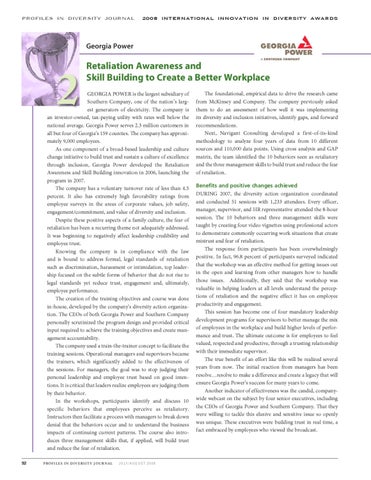Profiles in Diversity Journal
2008 International Innovation in Diversity Awards
Georgia Power
2
Retaliation Awareness and Skill Building to Create a Better Workplace
Georgia Power is the largest subsidiary of Southern Company, one of the nation’s largest generators of electricity. The company is an investor-owned, tax-paying utility with rates well below the national average. Georgia Power serves 2.3 million customers in all but four of Georgia’s 159 counties. The company has approximately 9,000 employees. As one component of a broad-based leadership and culture change initiative to build trust and sustain a culture of excellence through inclusion, Georgia Power developed the Retaliation Awareness and Skill Building innovation in 2006, launching the program in 2007. The company has a voluntary turnover rate of less than 4.5 percent. It also has extremely high favorability ratings from employee surveys in the areas of corporate values, job safety, engagement/commitment, and value of diversity and inclusion. Despite these positive aspects of a family culture, the fear of retaliation has been a recurring theme not adequately addressed. It was beginning to negatively affect leadership credibility and employee trust. Knowing the company is in compliance with the law and is bound to address formal, legal standards of retaliation such as discrimination, harassment or intimidation, top leadership focused on the subtle forms of behavior that do not rise to legal standards yet reduce trust, engagement and, ultimately, employee performance. The creation of the training objectives and course was done in-house, developed by the company’s diversity action organization. The CEOs of both Georgia Power and Southern Company personally scrutinized the program design and provided critical input required to achieve the training objectives and create management accountability. The company used a train-the-trainer concept to facilitate the training sessions. Operational managers and supervisors became the trainers, which significantly added to the effectiveness of the sessions. For managers, the goal was to stop judging their personal leadership and employee trust based on good intentions. It is critical that leaders realize employees are judging them by their behavior. In the workshops, participants identify and discuss 10 specific behaviors that employees perceive as retaliatory. Instructors then facilitate a process with managers to break down denial that the behaviors occur and to understand the business impacts of continuing current patterns. The course also introduces three management skills that, if applied, will build trust and reduce the fear of retaliation. 92
Pro f i les i n Di ve rsit y Journal
J u ly / A u g u s t 2 0 0 8
The foundational, empirical data to drive the research came from McKinsey and Company. The company previously asked them to do an assessment of how well it was implementing its diversity and inclusion initiatives, identify gaps, and forward recommendations. Next, Navigant Consulting developed a first-of-its-kind methodology to analyze four years of data from 10 different sources and 110,000 data points. Using cross analysis and GAP matrix, the team identified the 10 behaviors seen as retaliatory and the three management skills to build trust and reduce the fear of retaliation. Benefits and positive changes achieved During 2007, the diversity action organization coordinated and conducted 51 sessions with 1,233 attendees. Every officer, manager, supervisor, and HR representative attended the 8-hour session. The 10 behaviors and three management skills were taught by creating four video vignettes using professional actors to demonstrate commonly occurring work situations that create mistrust and fear of retaliation. The response from participants has been overwhelmingly positive. In fact, 96.8 percent of participants surveyed indicated that the workshop was an effective method for getting issues out in the open and learning from other managers how to handle those issues. Additionally, they said that the workshop was valuable in helping leaders at all levels understand the perceptions of retaliation and the negative effect it has on employee productivity and engagement. This session has become one of four mandatory leadership development programs for supervisors to better manage the mix of employees in the workplace and build higher levels of performance and trust. The ultimate outcome is for employees to feel valued, respected and productive, through a trusting relationship with their immediate supervisor. The true benefit of an effort like this will be realized several years from now. The initial reaction from managers has been resolve…resolve to make a difference and create a legacy that will ensure Georgia Power’s success for many years to come. Another indicator of effectiveness was the candid, companywide webcast on the subject by four senior executives, including the CEOs of Georgia Power and Southern Company. That they were willing to tackle this elusive and sensitive issue so openly was unique. These executives were building trust in real time, a fact embraced by employees who viewed the broadcast.
